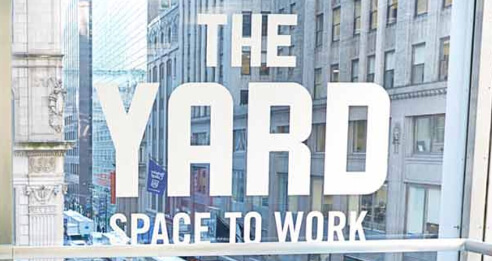
Largest Coworking Companies


Over the past decade, coworking has rapidly risen in popularity all over the world. It no longer caters only to freelancers and start-ups but attracts a wide range of people from different industries, as well as large organizations, like Microsoft, Google and Bank of America. The concept of coworking has transformed office culture as we know it.
While traditional office spaces have served us well for generations, they are rarely associated with innovation or creativity. To the contrary, workers there often report feelings of boredom and stagnation. With the rise of coworking spaces, the 9 to 5 system is beginning to give way to the new, better, work-life balance, offering its users flexibility, as well as an opportunity to be a part of a community and collaborate across different sectors. This, in turn, led to the growth of entrepreneurial culture, which is so closely tied with coworking environments, serving as innovation hubs. It’s clear that coworking is the way of the future.
Here’s a closer look at how this movement has affected the way we work.
The concept of coworking has become synonymous with flexibility. Individuals are drawn to it for its lack of constraints, with 24-hour access and ability to choose your own hours and location. Established businesses are attracted by lower infrastructure costs and maintenance when compared to a regular office.
To both, coworking spaces open the door to a less stressful work environment, which is becoming increasingly important in a society faced with high uncertainty, and where the numbers of remote workers, self-employed individuals, and cloud-based companies are increasing. Bigger corporations are choosing to embrace coworking spaces as well, for the abilities it gives to their employees to work when it’s most suitable for them. This leads to better work-life balance, which makes for happier workers who in turn work more efficiently. Even in the U.S., infamous for overworked employees, the concept of better work-life balance is becoming an important factor when people determine where they want to work.
Both individuals and businesses are beginning to understand that flexibility leads to higher productivity and a healthier lifestyle.
Another way in which coworking has affected the way we work is by building a strong sense of community among its members, and proving that you don’t need to belong to a traditional workplace in order to not feel isolated.
Connections with others are a big reason why people now choose to work in a coworking environment, as opposed to working from home or renting a nondescript office. Bringing independent workers together where they can socialize, share knowledge and network is at the core of this business model, which is built on the values of community, openness, collaboration, sustainability, and diversity. Coworking spaces claim that people are much more important to them than real estate and business. They’re not just selling spaces for people to work in, but first and foremost, they’re giving people an opportunity to meet others, exchange ideas and establish new relationships through involvement in the coworking space. Even for those less sociable, there’s still a sense of identification with the community, as they know there is a potential to interact with others if they wanted to.
Coworking offices have done a lot to honor the fact that humans are social creatures. From hiring community managers, whose jobs revolve around facilitating a well-functioning community, to office lunches, networking events and company outings — they take connecting members seriously. Unlike in a traditional office, where one can easily feel isolated or overlooked, in a coworking environment, everyone will feel like they belong.
One of the major positive side effects of coworking spaces is collaboration among its members. It is at the core of why many freelancers, remote workers, startups, and now corporate clients choose coworking to begin with.
When diverse groups of people from different companies, ventures and sectors work in a shared setting, interaction between them is inevitable. Coworkers bring with them their unique skill sets, which they’re often ready to provide to other community members. This leads to collaborations across different industries, boosting critical thinking and facilitating innovation. Even coworking space design is meant to encourage collaboration by providing a flexible office layout with lots of open workspaces and shared communal areas, making it easier for people to interact.
With this collision of diverse talent and social interaction at its core, it’s no wonder that coworking spaces have become the breeding ground for vibrant entrepreneurial activity.
Coworking environment promotes entrepreneurship by changing the traditional ways of operating a business, adopting new working methods and making it easier for people from different industries and sectors to network and collaborate. Even though coworking members work on their own and are fully devoted to their businesses, they are interested in others and participate in organized lunches, parties, and other community activities.
Entrepreneurs around the world also appreciate the ability to sublet workspaces at a significant price cut over regular office spaces. This model offers them more services, flexibility and reliability than traditional office leases.
Entrepreneurial culture will continue to thrive in coworking spaces, thanks to the infrastructure and framework they provide, supporting innovation and experimentation,
By now, more and more people are used to a flexible work environment, better work-life balance and other benefits provided to them by coworking offices. They’re used to being a part of a community and participating in different community events, as well as collaborating with their coworkers across different industries. All this creates a stimulating environment, with happier and more inspired workers, which leads to higher productivity, creativity, and entrepreneurial thinking. The tight connection between coworking and entrepreneurship is only growing stronger. This is proven by the continued investment of large companies in the coworking model, which in turn is allowing these companies to function with greater flexibility. Clearly, coworking has greatly affected the way we work, for the better.
Save your community manager 41 hours each week—learn how The Yard did it with cloud-based access control.
Read the Case StudyThe Guide to Make Your Space More Profitable
Including interviews with experts and consultants.
Free access to our best guides, industry insights and more.
